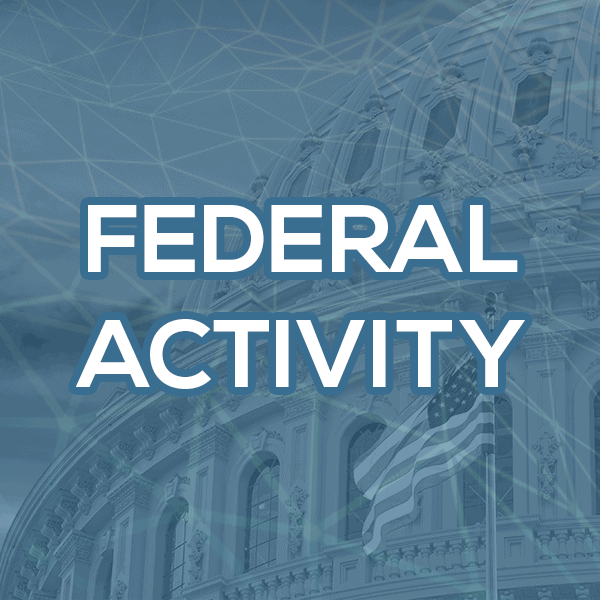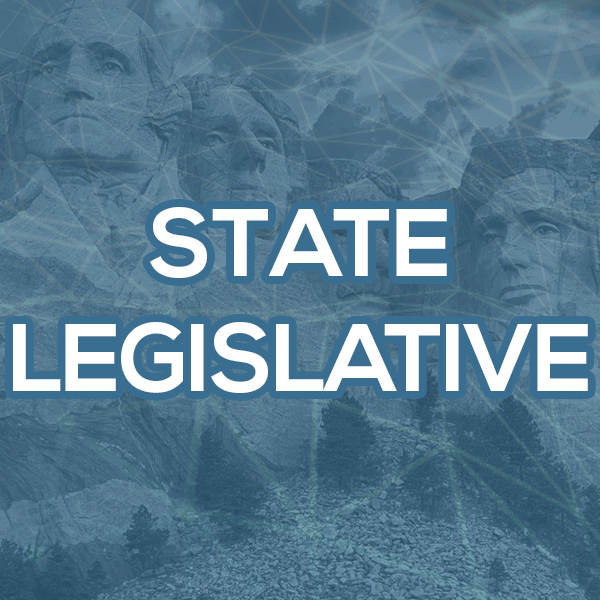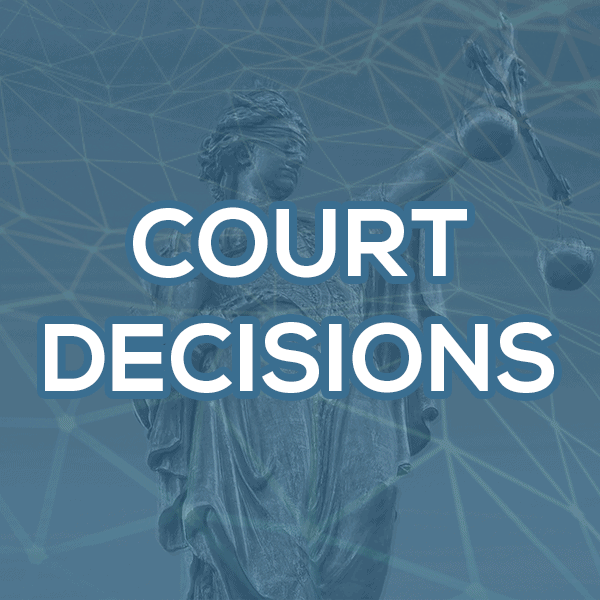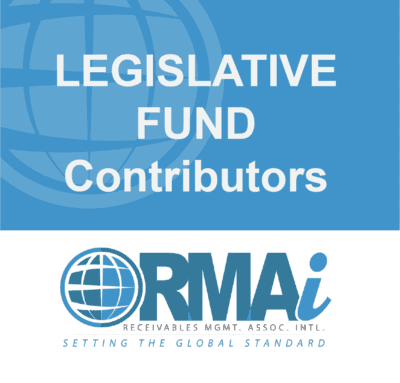
After an unusual start, we are beginning to see activity on Capitol Hill. On Thursday, March 9, the House Financial Services Subcommittee on Financial Institutions and Monetary Policy convened a hearing entitled Consumer Financial Protection Bureau: Ripe for Reform. The hearing largely followed party lines, with Republicans advocating for reforms that would make the CFPB subject to the annual congressional appropriations process and have a bipartisan 5-member leadership structure. Conversely, Democratic Members largely applauded the work of the CFPB in improving the lives of American consumers, protecting consumers from fraud and abuse, and promoting competition and transparency in the economy.
Additionally, at the end of February, the House Financial Services Committee approved Chair Patrick McHenry’s financial data privacy bill in a vote along party lines. The legislation is the culmination of three years of work, which proposes to revamp financial privacy protections for consumers and have them preempt state law, in an attempt to create a uniform federal standard.
On the regulatory front, RMAI continues the drafting of comments for the CFPB proposed rule to form a registry of non-bank entities. Comments are due on March 31st. RMAI will also submit limited comments for the 2023 CARD Act report. Comments are due on April 3rd.
RMAI is in the process of planning the educational sessions for the Executive Summit. Invitations to staff at the CFPB and FTC have been extended for the always-informative Federal Regulators Panel.

RMAI monitors, tracks, and responds to legislative and regulatory activity in all 50 states as the need arises. Backed by RMAI’s State Legislative Committee and a team of state lobbyists, RMAI educates legislators and regulators about the industry and the negative impacts or unintended consequences a bill would have on businesses and consumers. If you have an interest in volunteering in RMAI’s grassroots advocacy efforts, please contact RMAI General Counsel David Reid at (916) 779-2492 or [email protected]. The following bills of concern are a sample of the legislation that RMAI is currently engaging on behalf of the industry:
Colorado HB 1126 – This bill would prohibit consumer reporting agencies from including information related to a medical debt on a consumer report. The bill defines “medical debt” as “debt arising from health-care services . . . or health-care goods, including products, devices, durable medical equipment, and prescription medications.” This is a very expansive definition which would include medical debt charged on a credit card, including a bottle of Tylenol purchased from a grocery store. [RMAI is strongly opposed to this bill and is working with our Colorado lobbyist and other industry trade associations to get an exemption for credit card debt. If this bill is passed, without an exemption, we expect consumer reporting agencies will likely stop reporting all credit card debt in Colorado due to the difficulty in identifying the debt.]
Florida HB 113 – This bill would provide relief from collection activities to victims of elder abuse and human trafficking, provided that documented economic abuse is attested to in a police report that shows the connection to the perpetrator. [This issue is becoming more prominent at the state legislative level. Currently, only California and Maine have laws of this nature, but a number of states are looking to follow suit. RMAI believes this bill could be a “model” for future bills as it includes reasonable safeguards to prevent mere statements of abuse from qualifying for the protection.]
Georgia HB 187 – This bill would allow for-profit credit repair agencies to operate in the State of Georgia if they: (1) obtain a bond in the amount of $50,000; (2) provide a written contract to the buyer of services, setting out the services it provides and the amount that will be due each month for such services; (3) provide an information statement informing the buyer of the buyer’s right to challenge and dispute items on a credit report on the buyer’s own and stating that the credit repair services organization will only challenge or dispute items that the buyer affirms are either unfair, inaccurate, or unsubstantiated; and (4) provide the right to cancel services at any time. [RMAI opposes this bill as it does not afford meaningful consumer protections against credit repair abuse.]
Illinois HB 2377 – This bill, among other things, would: (1) increase the homestead exemption from $15,000 to $260,000; (2) increase the auto exemption from $2,400 to $25,000; (3) increase certain personal property exemptions; and (4) limit the amount of wages that can be applied through garnishment to the lesser of 10% of gross weekly wages or the amount by which disposable earnings for a week exceed the total of 80 times (current law is 45 times) the state minimum hourly wage. [RMAI is working with the industry in opposition to this bill. While RMAI acknowledges the auto, personal property, and homestead exemptions could be updated, many of the new thresholds proposed in the bill are overly high. Additionally, the current wage garnishment exemption of 45 times minimum wage is already higher than all but two states.]
Kentucky HB 83 – This bill would reduce the enforceability of a money judgment to 10 years with no renewals. [RMAI is opposed to this legislation but does not anticipate the bill gaining traction; however, RMAI will closely monitor. Currently, actions on judgments must be commenced within 15 years from the date of the last execution and can be extended by filing a lien or garnishment.]
Maryland HB 127 – This bill would prohibit a district court in aiding in the enforcement or execution of a small claims money judgment by ordering an individual to appear for an examination or answer interrogatories. [RMAI, the creditor’s bar, and the judiciary oppose this bill. A similar bill passed in 2022 but was vetoed by the former governor. A veto this year would be less likely.]
Nevada AB 223 – This bill would require debt collectors to provide a payoff letter within 10-days of a consumer request. The bill also provides for a private right of action for failure to provide a payoff letter in the required time. [RMAI is seeking amendments through our lobbyist to provide additional time to send the letter, to detail how a request must be made, and to provide a safe harbor for reasonable attempts to comply.]
New York AB 1035 – This bill would prohibit debt collectors from communicating with consumers through the use of email, text messaging, or private communication tools offered by social media companies. [RMAI is strongly opposed to this bill and has the resources of RMAI’s New York lobbyist to help ensure that the bill is not considered.]
New York SB 171 – This bill would create a private right of action against originating creditors and debt collectors for a violation of the Debt Collection Procedures Act. Currently only the attorney general or a county district attorney can bring an action to restrain or prevent any violation of the article. A consumer could seek actual damages, punitive damages awarded by the court, and reasonable attorney’s fees. [RMAI will be advocating for amendments to this bill that would create a “right to cure” opportunity before suit can be filed. RMAI has a registered New York lobbyist.]
New York SB 4750 – This bill would expand the scope of the 2021 Consumer Credit Fairness Act (CCFA) by replacing the term “consumer credit transaction” with “consumer debt” and thereby bringing debt such as medical and utility under the scope of the CCFA’s litigation requirements. [This bill could potentially solve a problem contained in the proposed debt collection rule developed by the New York State Department of Financial Services (DFS). DFS is struggling with how to develop an appropriate consumer notice since the CCFA does not apply to all forms of consumer debt. However, the bill will need to be amended to exempt judgments from the bill’s scope.]
New York SB 5010 – This bill would expunge all debt associated with consumer credit transactions at the expiration of the statute of limitations. [RMAI is strongly opposed to this bill and has the resources of RMAI’s New York lobbyist to help ensure that the bill is not considered.]
Oregon HB 2008 – This bill, among other things, would: (1) increase the auto exemption from $3,000 to $15,000; (2) increase various personal household property exemptions; (3) increase the homestead exemption from $40,000 to the median housing price for single-family dwellings in the county in which the homestead is located; and (4) protect approximately $52,000 in wages from garnishment. The bill would also authorize the award of punitive damages as part of a private right of action. [RMAI, while acknowledging some of the exemption thresholds could be increased, is strongly opposed to this bill as it is currently drafted. RMAI will be working with an industry coalition to seek amendments.]
Washington SB 5173 – This bill would update the state property exemption provisions. The most notable changes include: (1) increasing the auto exemption from $6,500 to $15,000; (2) increasing the tools of the trade exemption from $10,000 to $15,000; (3) an across the board doubling of the exemption amount for married couples; and (4) adding a cost-of-living adjustment. [RMAI is working with an industry coalition to fight this legislation based on recent adjustments to this section of law during the pandemic.]
Wyoming HB 284 – This bill was enacted into law on February 27th. The law will require debt buyers to be licensed as collection agencies as of July 1, 2023. The law contains a provision stating the act will not affect the validity of any civil action or arbitration filed or commenced by a debt buyer, or any judgment entered for a debt buyer before July 1, 2023. [This bill was introduced at the request of RMAI to address an emerging debate as to whether debt buyers should have been licensed under existing law despite the state licensing board issuing exemptions for over 20 years.]

Sixth Circuit Holds Continuing Violation Doctrine Inapplicable to Alleged FDCPA Violation Occurring During Litigation
Bouye v. Bruce, No. 21-6195/22-5016, 2023 U.S. App. LEXIS 4979 (6th Cir. Mar. 1, 2023)
A consumer financed a furniture purchase through a retail installment contract (“RIC”). The RIC was sold to a financing company and the consumer subsequently defaulted. The financing company, through its attorney, sued in state court to recover the debt and attorney’s fees. Ultimately, due to evidentiary issues, the financing company voluntarily dismissed the lawsuit.
Over a year after the financing company filed its lawsuit in state court, the consumer sued the financing company’s attorney in federal court claiming the attorney violated the Fair Debt Collection Practices Act (“FDCPA”) by altering the RIC during the state court litigation to make it appear that the assignment to the financing company was proper. The attorney filed a motion to dismiss, arguing the action was “barred by the FDCPA’s one-year statute of limitations or by Rooker-Feldman and collateral estoppel.” The trial court granted the motion and the consumer appealed.
Addressing the statute of limitations question, the U.S. Court of Appeals for the Sixth Circuit noted that while the consumer argued the violation occurred when the RIC was modified, which was less than a year prior to the filing of the FDCPA lawsuit, the attorney argued any alleged violation would have been “just a continuing violation of [the finance company’s] initial filing of the lawsuit, and that “the statute of limitations began running when [the finance company] filed the state-court complaint.”
The Court disagreed with the attorney’s “continuing violation” argument:
The continuing-violation doctrine doesn’t have anything to do with this case, though, because [the consumer] never invoked it. And it makes sense that she didn’t. The whole benefit of the continuing-violation doctrine is that it allows a plaintiff to sweep in a series of component acts that comprise a claim, if one of those acts was within the limitations period. But [the consumer] isn’t trying to sweep in acts that would otherwise be outside of the filing period. She is seeking redress for a single claim that is not time-barred – [the attorney’s] filing of the second, allegedly false RIC in the state lawsuit on [the finance company’s] behalf.
Thus, the Court reversed the trial court’s dismissal and remanded the matter.
Fourth Circuit Finds Lack of Standing for Alleged Violation of State Identity Theft Act
O’Leary v. TrustedID, Inc., No. 21-2144, 2023 U.S. App. LEXIS 3968 (4th Cir. Feb. 21, 2023)
Following the Equifax data breach, Equifax used a subsidiary’s website as a platform for consumers to use to determine whether they had been affected by the breach. A consumer went to the website and was required to enter six digits of his Social Security number (“SSN”). No other security features were in place. Allegedly, the partial SSN was then conveyed to Equifax.
The consumer then filed a lawsuit in state court against the subsidiary alleging a violation of South Carolina’s common-law right to privacy, and S.C. Code Ann. § 37-20-180(A)(4) which prohibits “require[ing] a consumer to use his social security number or a portion of it containing six digits or more to access an Internet web site, unless a password or unique personal identification number or other authentication device is also required to access the Internet web site.”
The subsidiary removed the case to federal court and moved to dismiss, and the consumer brought a challenge to his own Article III standing. The trial court determined that the consumer had sufficiently alleged Article III standing but granted the subsidiary’s motion to dismiss as the consumer “had not plausibly stated a claim under the Act or under common-law principles of privacy or negligence.”
On appeal to the U.S. Court of Appeals for the Fourth Circuit, the consumer “again note[d] his ‘concerns as to whether the [statutory] violation in this case constitutes a concrete injury in fact for Article III standing,’” but nevertheless asked the Court to affirm the trial court’s holding on the issue and reverse the dismissal of the statutory claim.
On the issue of standing, the Court examined similar claims involving the Fair and Accurate Credit Transactions Act (“FACTA”) which in part provides: “Except as otherwise provided in this subsection, no person that accepts credit cards or debit cards for the transaction of business shall print more than the last 5 digits of the card number or the expiration date upon any receipt provided to the cardholder at the point of the sale or transaction.” 15 U.S.C. § 1681c.
The Court located only one appellate court decision in which standing was found for a FACTA violation with the others “show[ing] that a FACTA digit-truncation violation isn’t a concrete injury unless it creates a nonspeculative risk of identity theft.”
The Court also examined data breach cases and noted that “being subjected to a data breach isn’t in and of itself sufficient to establish Article III standing without a nonspeculative, increased risk of identity theft.”
In this case, the Court found the consumer couldn’t “connect the alleged statutory violation to an increased risk of identity theft without a Rube Goldberg-type chain reaction.”
For example, crediting his allegation “on information and belief” that TrustedID shared his six SSN digits with Equifax, there would have to be another Equifax data breach, that breach would have to compromise [the consumer’s] partial SSN, and an identity thief would then have to misappropriate that information to harm [the consumer] (presumably by first figuring out the rest of his SSN). That’s the kind of daisy chain of speculation that can’t pass muster under Article III.
Furthermore, the consumer failed to “allege[] an injury with a ‘close relationship’ to a traditional or common-law analog.” The Court explained that “intrusion upon seclusion” was not a close analogy because the consumer chose to provide his SSN. The consumer failed to argue any relationship to the “traditional analog” of “disclosure of private information.”
The Court “therefore vacate[d] the district court’s judgment and remand[ed] with instructions to remand this case to state court, where it originated.”
Eighth Circuit Holds Allegedly Inaccurate Interest Disclosure Does Not Confer Standing
Bassett v. Credit Bureau Servs., Nos. 21-2864, 22-1206, 2023 U.S. App. LEXIS 4428 (8th Cir. Feb. 24, 2023)
A consumer received a letter seeking payment for medical bills. The letter didn’t distinguish between interest or principal in the amount owed and stated, “interest and other charges may accrue daily.” The consumer brought a class action alleging violations of the Fair Debt Collection Practices Act and the Nebraska Consumer Practices Act.
The debt collector filed a motion for summary judgment, based on a lack of Article III standing, which the trial court denied. Although the jury returned a verdict for the debt collector, the court determined it had provided inaccurate instructions to the jury and, on its own motion, ruled in favor of the consumer, specifically finding that Nebraska law did not authorize collection of prejudgment interest without a judgment.
On appeal to the U.S. Court of Appeals for the Eighth Circuit, the collectors argued that the consumer did not suffer concrete harm and therefor lacked Article III standing.
The Court explained that the consumer “only received the letter and never paid any part of the interest or principal. Without suffering a tangible harm, [the consumer] must point to an injury that has a ‘close relationship’ to a harm ‘traditionally’ recognized as providing a basis for a lawsuit in American courts.” Here, the consumer chose fraudulent misrepresentation and conversion.
The Court, citing numerous decisions, noted that a claim for fraudulent misrepresentation must be supported by reliance on the misrepresentation, which the consumer failed to allege. Thus, because “[the consumer] did not suffer a concrete injury in fact as a result of the alleged statutory violations, she lack[ed] Article III standing,” and the Court vacated the judgment of the trial court and remanded the matter.
Third Circuit Confirms Collectors Can Rely on Court Records
Lowe v. FBCS, Inc, No. 21-3307, 2023 U.S. App. LEXIS 609 (3d Cir. Jan. 11, 2023)
A debt collector brought a collection action against a consumer that resulted in contradictory orders from the state court. On one hand, the clerk of court erroneously entered a default judgment against the consumer prior to trial, but on the other the court dismissed the action because the debt buyer failed to appear on the trial date. Several years later, the court confirmed the default judgment and the debt collector began contacting the consumer to collect the debt.
The consumer filed suit in federal court alleging the debt collector violated the Fair Debt Collection Practices Act (“FDCPA”) by trying to collect a debt it “’knew or should have known . . . was unenforceable’ and thus made a false representation in violation of the FDCPA, 15 U.S.C. §§ 1692e(2)(A), (5), (10).” The consumer also filed a motion with the state court to have the default judgment vacated and declared void from its inception. That motion was ultimately granted.
In the FDCPA action, the trial court granted the debt collector’s motion for summary judgment, reasoning “that Defendants’ alleged efforts to collect the debt were not false or misleading because even though the default judgment is now considered invalid, the judgment nevertheless existed in 2019 when the alleged communications were made.” The consumer appealed.
The U.S. Court of Appeals for the Third Circuit, in a non-precedential opinion, first addressed the consumer’s argument that the trial court’s order violated the Rooker-Feldman doctrine because it “could not have reached the decision that it did without necessarily supplanting the Superior Court’s order vacating the judgment against her.”
However, the Court found that the consumer met none of the doctrine’s four requirements: “(1) the federal plaintiff lost in state court; (2) the plaintiff ‘complains of [*6] injuries caused by the state-court judgments’; (3) those judgments were rendered before the federal suit was filed; and (4) the plaintiff is inviting the district court to review and reject the state judgments.”
The consumer also argued that the federal trial court erred in holding that the erroneous default judgment was “in effect . . . until such time as it was vacated” since the state court ultimately declared it void from the beginning. The Court disagreed, finding that the federal trial court correctly determined that the consumer failed to demonstrate a genuine issue for trial. Since the default had not been vacated at the time of the collection communications, those communications “would not misrepresent the ‘legal status’ of the judgment, 15 U.S.C. § 1692e(2)(A), or constitute a ‘threat to take any action that cannot legally be taken,’ id. § 1692e(5).”
Accordingly, the trial court’s grant of summary judgment in favor of the debt collector was affirmed.

RMAI has been hard at work in 2023 fighting legislation that could be detrimental to the receivables management industry. RMAI has retained lobbyists in multiple states, including California, New York, Nevada, Colorado, Massachusetts and Wyoming, and will secure a lobbyist for Oregon due to Oregon HB 2008. Your donations help us continue to fight bad legislation. We hope that you will consider donating, in any amount, to RMAI’s Legislative Fund. If you’d like to contribute to the Legislative Fund, you can donate here. We will add your company name to our list of contributors on our website. Click here to see a list of current contributors on the right-side bar.
Executive Summit Silent Auction
Thank you to everyone who participated in the success of our Annual Conference Silent Auction! Soon we will be turning our attention to our Executive Summit Silent Auction which will take place at the end of July and will finish at the Summit on August 2, 2023. Now is the time to start thinking of some great silent auction items to donate. We will keep you informed of our progress as we move through these next few months.

The Importance of Cyber Insurance and Cybersecurity
Register now for our April 13th webinar on cybersecurity & cyber insurance. Our presenters will take a deep dive into the nuances of cyber insurance sub limits, requirements, regulatory hurdles and more.
While you’re waiting for the April webinar, you can prepare by watching our March 8th webinar which gave a high level overview of data security, cybersecurity & cyber insurance. Click here for more information on our live and recorded webinars.
Suggest a Webinar Topic or Presentation for 2023
We are planning monthly educational webinars for 2023 and always look for fresh topics and ideas for our webinar programming. If you have a webinar you would like to present on or a topic that is timely for the receivables management industry, you can propose an Educational Presentation and our Education Committee will review your submission.
Sponsor a Webinar in 2023
Sponsor an RMAI webinar and accomplish some targeted marketing to webinar attendees. Sponsoring a webinar is a great way to get you and your brand in front our members and share a little bit about your company. When you sponsor a webinar, you receive a variety of benefits including:
- Logo placement on the live webinar marketing flyer, weekly e-blasts and social media posts distributed to over 1,500 industry professionals and made available on the RMAI website
- Logo placement on the RMAI website for the live webinar
- Continued logo placement for one (1) year on the RMAI website for the recorded webinar
- Final attendee list with full contact information pre-and post-webinar
- Sponsor introduction by RMAI host
- Option to give sponsor pitch (2-3 minutes) at beginning of live webinar
- Choice of providing your own customized sponsor slide OR logo placement on RMAI sponsor slide in PPT Presentation to complement sponsor introduction and sponsor pitch
Contact Shannon Parod at [email protected] or (916) 482-2590 with any questions.

Congratulations to our new and renewed Certified Receivables Compliance Professionals (CRCP), new and renewed Certified Receivables Businesses (CRB) and renewed Certified Receivables Vendor (CRV). Since December 2022
CRCP New
Mohammad Azad, Cavalry Portfolio Services
Joe Barbito, Velocity Portfolio Group
Melissa Brandjord, FFAM360
Amy Brown, Gurstel Law Firm
Tonia Brown, ARM Compliance Business Solutions
Shaun Campbell, Dobberstein Law Firm
Shannon Eckert, Crown Asset Management
Lily Hamilton, Resurgent Holdings
Sean Hoover, Collection Attorneys USA
Eric Logvin, Law Offices of James R. Vaughan
Joel May, Crown Asset Management
Rick Paulin, ARM Compliance Business Solutions
Jill Pheffer, TrueAccord
Joshua Shea, United Holding Group
Brooke Teal, EverChain
Zachary Tharrett, Velocity Portfolio Group, Inc.
Jessica Weinert, Resurgent Holdings
CRCP Renewals
Susan Appel, Unifund CCR LLC
Autumn Bloom, Pollack & Rosen P.A.
Anna Garcia, Steel River Systems, LLC
Nicole Gelinas, Integras Capital Recovery LLC
David Jones, Stenger & Stenger, P.C.
Benjamin LaRue, Hilco Receivables
Don Maurice, Maurice Wutscher, LLP
Teresa Mautz, Orion Portfolio Services, LLC
Nikki Noyes, The Bureaus, Inc.
Katherine O’Brien, Barron & Newburger, P.C.
Javier Palmero, Hilco Receivables, LLC
Tyler Peska, Credit Management Corporation
Scott Renner, Velo Law Office
Michael Ross, Hilco Receivables
Marian Sangalang, The Bureaus, Inc.
Daniel Schindler, Pro Forma/Plaza Services
Deanna Sgro, Velocity Portfolio Group, Inc.
Lisa Soller, Autovest, LLC
Elizabeth Stockbridge, Full Circle Financial, LLC
CRB New
Bayview Solutions, LLC
Denali Capital
CRB Renewal
Autovest, LLC
Cascade Capital, LLC
CKS Financial
Galaxy Capital Acquisitions
Invenio Financial a Phillips & Cohen Associates Company
Midland Credit Management
NCB management Services, Inc.
O & L Law Group
Quantum3 Group, LLC
Security Credit Services, LLC
Spring Oaks Capital
The Cadle Company
CRV Renewals
National Loan Exchange, Inc. (NLEX)
Version 11.0 Adopted
On March 1st, 2023, RMAI adopted version 11.0 of the Receivables Management Certification Program which added several significant enhancements, including:
- Expanding the program to include commercial debt standards for Certified Receivables Businesses (CRB)
- Creating a specialty Certified Receivables Vendor (CRV) certification for process servers
- Requiring a Pre-Certification Audit for debt buyers, collection agencies, and collection law firms that seek initial certification on or after March 1, 2024. Applications received prior to this date will not require a Pre-Certification Audit.
CRCP Application (apply for individual certification)
CRB Application (for debt buyers, collection agencies and collection law firms
CRV Application (for brokers, defense law firms, vendors/Affiliate Members)
View all certified businesses and vendors.
View all certified individuals.
View educational requirements for certified individuals.
For questions about certification, contact RMAI at (916) 482-2462 or email [email protected].

Maximize Your RMAI Membership!
Download Maximizing Your RMAI Membership – How to Make the Most Out of Your RMAI Experience, courtesy of the Membership Committee. This complimentary resource will help you boost your membership engagement and advance your networking connections. Find out about attending in-person events, featuring education and networking; learning, through live and recorded webinars; earning certification; and getting involved.
Welcome, New Members
- BMO Financial Group | Canada
- D1AL | NY
- DBC Holdings, LLC a Subsidiary of Receive Revenue Recovery | IN
- Deinde Financial | IL
- Leafy Financial, LLC | TX
- LegalStream | KS
- Parker, Simon & Kokolis, LLC | MD
- Sacor Financial, Inc | CA
- Schreiber Law, LLC |NH
- Smith Debnam Narron Drake Saintsing & Myers, LLP | NC
For a complete list of RMAI members, please login to check out the Member Directory.

RMAI Digital Dispatch
Keep your eyes peeled for RMAI’s spring publication, launching April 3rd! The Digital Dispatch will be available to primary contacts and additional membership representatives in digital format, as a flipbook. RMAI will email the publication and post it on our website.
Advertise with RMAI
The best strategy to reach buyers and potential business partners in the receivables management industry is an integrated advertising program that combines the best of print, online and event communications. Advertising in RMAI’s media channels—website, RMAI Insights, RMAI Update e-newsletter, or sponsored social media and email—gives you broad access to RMAI members, creating awareness for your brand and new business opportunities.

RMAI’s leadership cultivates relationships within the receivables management industry to expand business opportunities for members.
2023 NCBA Connect Conference | May 3-5, 2023
RMAI 2023 Executive Summit | August 1-3, 2023

Thank you to our March 2022 – March 8, 2023 Legislative Fund Contributors!
Diamond $25,000
Cavalry Investments, LLC
Crown Asset Management, LLC
Financial Recovery Services, Inc.
First Financial Portfolio Services, LLC
Midland Credit Management
Portfolio Recovery Associates, LLC
Resurgent Holdings, LLC
Velocity Portfolio Group, Inc.
Titanium $15,000
Pressler, Felt and Warshaw, LLP
Platinum $10,000
Blitt and Gaines, P.C.
Cascade365 Family of Companies
Garnet Capital Advisors, LLC
InvestiNet, LLC
National Credit Adjusters, LLC
Plaza Services, LLC
Second Round, LP
Unifund CCR LLC
Gold $7,500
Miller and Steeno, P.C.
Rausch Sturm, LLP
Superlative RM
Silver $5,000
Andreu, Palma, Lavin & Solis, PLLC
AscensionPoint Recovery Services, LLC
CKS Financial
Corporate Advisory Solutions, LLC
Digital Recognition Network
EverChain
FMA Alliance, Ltd
Halsted Financial Services, LLC
Klima, Peters & Daly, P.A.
National Loan Exchange, Inc.
Pharus Funding, LLC
Provana, LLC
Spring Oaks Capital, LLC
T & I Enterprises, LLC
Tromberg, Morris & Poulin, PLLC
Velo Law Office
Bronze $2,500
Absolute Resolutions Corp.
Acctcorp International, Inc.
Central Portfolio Control, Inc
Couch Lambert
DebtNext Software, LLC
Ragan & Ragan, PC
RAzOR Capital, LLC
Resurgence Capital, LLC
Security Credit Services, LLC
Stillman Law Office
Tobin & Marohn
Troutman Pepper
Weltman, Weinberg & Reis Co., L.P.A.
Brass $1,000
Action Collection Agencies, Inc.
Actuate Law, LLC
AKCP LLC
Aldridge Pite Haan, LLP
Arbeit
Arko Consulting LLC
Balbec Capital
Barron & Newburger, P.C.
Beam Software
Bread Financial
Butler & Associates, P.A.
C&R Software
Call Center Services International
Capio
CBK, Inc.
CCMR3
Cedar Holdings International Inc. DBA Cedar Financial
Commercial Credit Group Inc.
Commercial Funding Inc.
Convergence Acquisitions, LLC
Cornerstone Support, LLC
CSS Impact
D & A Services, LLC
Dobberstein Law Firm, LLC
Epicenter Technologies Pvt. Ltd.
Equabli, Inc
FLOCK Specialty Finance
G. Reynolds Sims & Associates, P.C.
Genesis Recovery Services
Gordon, Aylworth & Tami, P.C.
Guglielmo & Associates, PLLC
Harvest Strategy Group, Inc.
Hinshaw & Culbertson
Hunt & Henriques, LLP
International Debt Buying Consultants, LLC
Invenio Financial, a Phillips & Cohen Associates company
Investment Retrievers, Inc.
Jefferson Capital Systems, LLC
Kota Business Solutions LLC
Law Offices of Goldberg & Oriel
Levy & Associates, LLC
Lockhart, Morris & Montgomery, Inc.
Mandarich Law Group LLP
Maxwell & Graves Solutions, LLC
Metacorp, LLC
Mountain Peak Law Group, PC
National Debt Holdings, LLC
Nelson & Kennard
NRA Group, LLC
Nuvei
PCI Group Inc.
Phin Solutions, LLC
Portnoy Schneck, LLC
Premier Forty Financial, LLC
Quall Cardot, LLP
Quantum3 Group, LLC
RevSpring
Robinson Hoover & Fudge, PLLC
Scott & Associates, PC
Sequium Asset Solutions, LLC
SimpleCertifiedMail.com
Skit.ai
Slovin & Associates
Solutions by Text
Stenger & Stenger P.C.
Stone, Higgs & Drexler
Suttell & Hammer
Synergetic Communication Inc
The Cadle Company
TrueAccord
US Mortgage Resolution, LLC
USASF Servicing, LLC
Venable LLP
VeriFacts, LLC.
Vertican Technologies, Inc.
VoApps, Inc.
Other
Alliance Credit Services, Inc.
ARM Compliance Business Solutions LLC
Atlas Acquisitions
Bedard Law Group, P.C.
CMS Services
Coastal Law Firm, APLC
Converging Capital, LLC
Convoke, Inc.
Credit Corp Solutions Inc.
Credit Management Corporation
D1AL
Delev & Associates, LLC
InDebted
Kino Financial Co., LLC
Kirschenbaum & Phillips, P.C.
Law Offices of Steven Cohen LLC
London & London
Martin Lyons Watts Morgan PLLC
MauriceWutscher LLP
Moss & Barnett, P.A.
National Recovery Solutions, LLC
Poser Investments, Inc.
ProVest LLC
Receivables Management Association International
Resource Management Services, Inc.
SAM – Solutions for Account Management
Sandia Resolution Company, LLC
SCJ Commercial Financial Services
Simmonds & Narita LLP
Sonnek & Goldblatt, Ltd.
Stone Creek Financial Inc.
Tate & Kirlin Associates, Inc.
The Oakes Law Firm, LLC
Troy Capital, LLC
United Acquisitions, LLC
Vargo & Janson, P.C.
Venandi Systems, LLC














